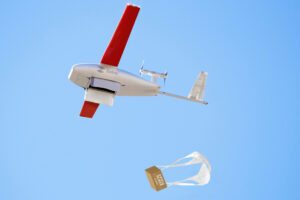
In recent years, the global Medical Supply Delivery Service Market has seen exponential growth, with revenues surpassing the US$50 billion mark in 2022. This market’s trajectory is poised for robust expansion, driven by various factors that are reshaping the landscape of healthcare logistics.
UK-based healthcare logistics company Apian is teaming up with Zipline, the world’s largest autonomous instant delivery company, to significantly amplify the NHS program delivering medical supplies to healthcare facilities. The expansion, set to roll out with Northumbria Healthcare NHS Foundation Trust by the autumn of 2024, is expected to create local job opportunities in the region.
The global Medical Supply Delivery Service Market is highly competitive, featuring both local and global players vying for market share. Notable companies in this space include DHL, UPS, Agility, LogistiCare Solutions, LLC, FedEx Corporation, CEVA Logistics, The Wing, International SOS, Matternet, Zipline, Flirtey, and Swoop Aero, according to Fairview Market Research.
Apian and Zipline’s collaboration with the NHS marks a significant milestone as the first commercial partners in the UK for Zipline. The partnership builds upon Zipline’s successful track record in North America, Asia, and Africa. Leveraging Zipline’s delivery system, known for its use by companies like Cleveland Clinic, Pfizer, and Walmart, the NHS aims to create a more efficient supply chain for medical devices and prescriptions. The autonomous drone delivery service will provide timely access to prescriptions, wound care, and other frequently needed medical products.
“I’ve seen first hand the impact that running out of supplies can have on patient health outcomes,” said Dr. Christopher Law, Medical Director and Co-Founder of Apian. “Healthcare should benefit from on-demand delivery, much like consumers now do in their personal lives. Delivering critical products with drones, where and when they’re most needed, will improve supply chain efficiency and give doctors, nurses and clinicians more time to focus on the most important thing — their patients.”
Sir James Mackey, Chief Executive Officer of Northumbria Healthcare NHS Foundation Trust, anticipates positive outcomes from the expansion, stating, “This innovative technology could be used to improve healthcare outcomes, save money, and eliminate supply chain complexities.”
Zipline will centralize the inventory of frequently ordered products and deliver them to healthcare facilities within minutes of receiving orders. The program initially targets four regional health facilities and plans to serve over 30 GP, care, and health facilities across the region over time.
Zipline’s CEO and Co-Founder, Keller Rinaudo Cliffton, emphasizes the environmental and financial benefits, stating, “This decision means that the NHS can start to transition delivery to solutions that are ten times as fast, less expensive, and zero emission.”
Zipline will establish a hub for its operations near the Northumbria Specialist Emergency Care Hospital in Cramlington, Northumberland. The fleet of fully autonomous aircraft, known as Zips, can travel up to 130 miles roundtrip in almost any weather condition, releasing packages with parachutes.
Since its founding, Zipline has flown more than 60 million commercial miles and delivered millions of medical products worldwide, including over 13 million vaccine doses. Independent studies from leading institutions have shown that the Zipline delivery system has saved lives, reduced blood wastage, and lowered the likelihood of medical product stockouts.
Read more:
- What’s Inside the Zipline Platform: NVIDIA’s Jetson Edge AI
- Cleveland Clinic to Use Zipline for Drone Delivery of Medical Supplies
- Zipline to Offer Food Delivery from Mendocino Farms: Integrated into Food Service Workflows
- FAA Authorizes Zipline for Drone Delivery Beyond Visual Line of Sight
Miriam McNabb is the Editor-in-Chief of DRONELIFE and CEO of JobForDrones, a professional drone services marketplace, and a fascinated observer of the emerging drone industry and the regulatory environment for drones. Miriam has penned over 3,000 articles focused on the commercial drone space and is an international speaker and recognized figure in the industry. Miriam has a degree from the University of Chicago and over 20 years of experience in high tech sales and marketing for new technologies.
For drone industry consulting or writing, Email Miriam.
TWITTER:@spaldingbarker
Subscribe to DroneLife here.